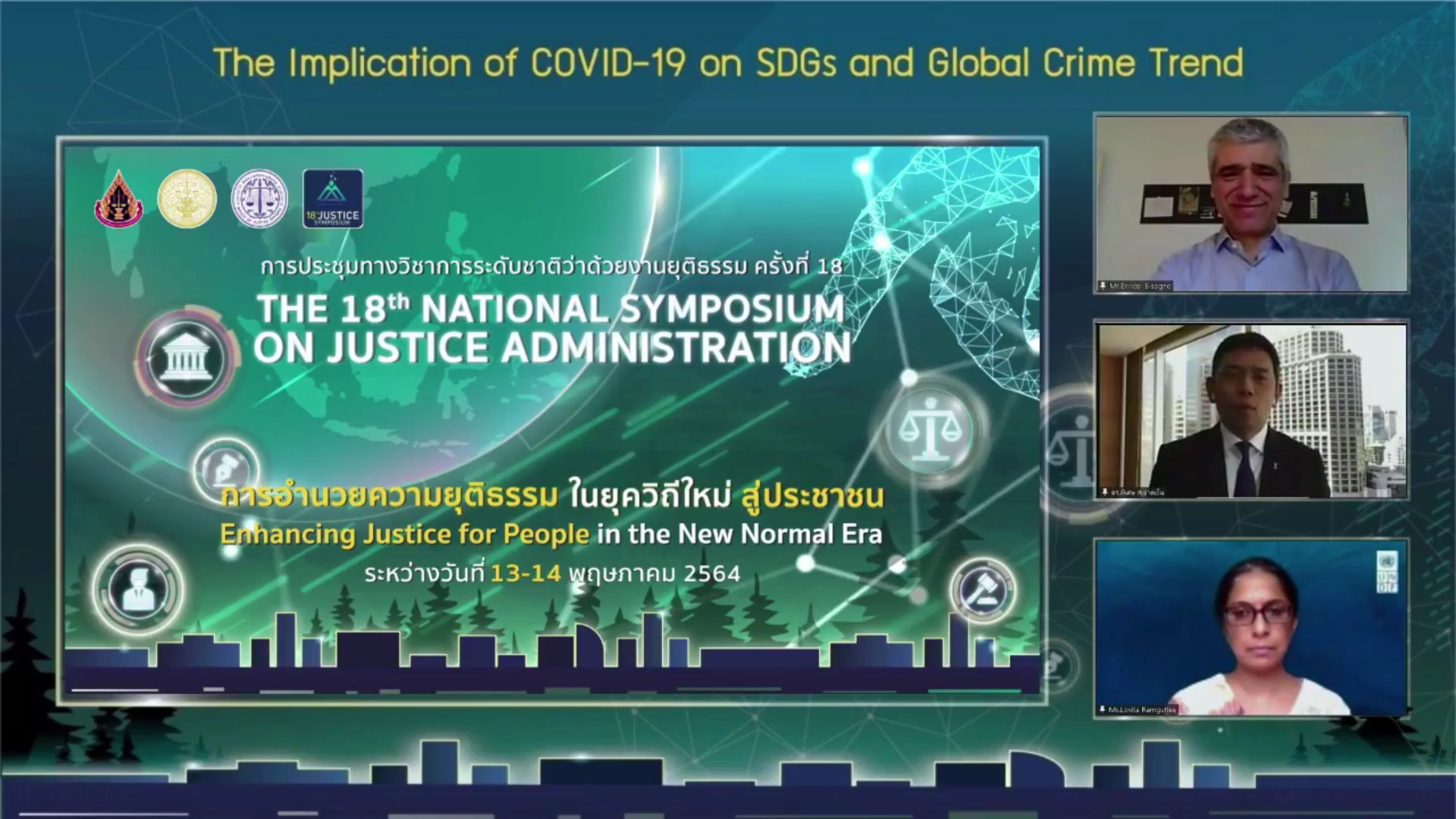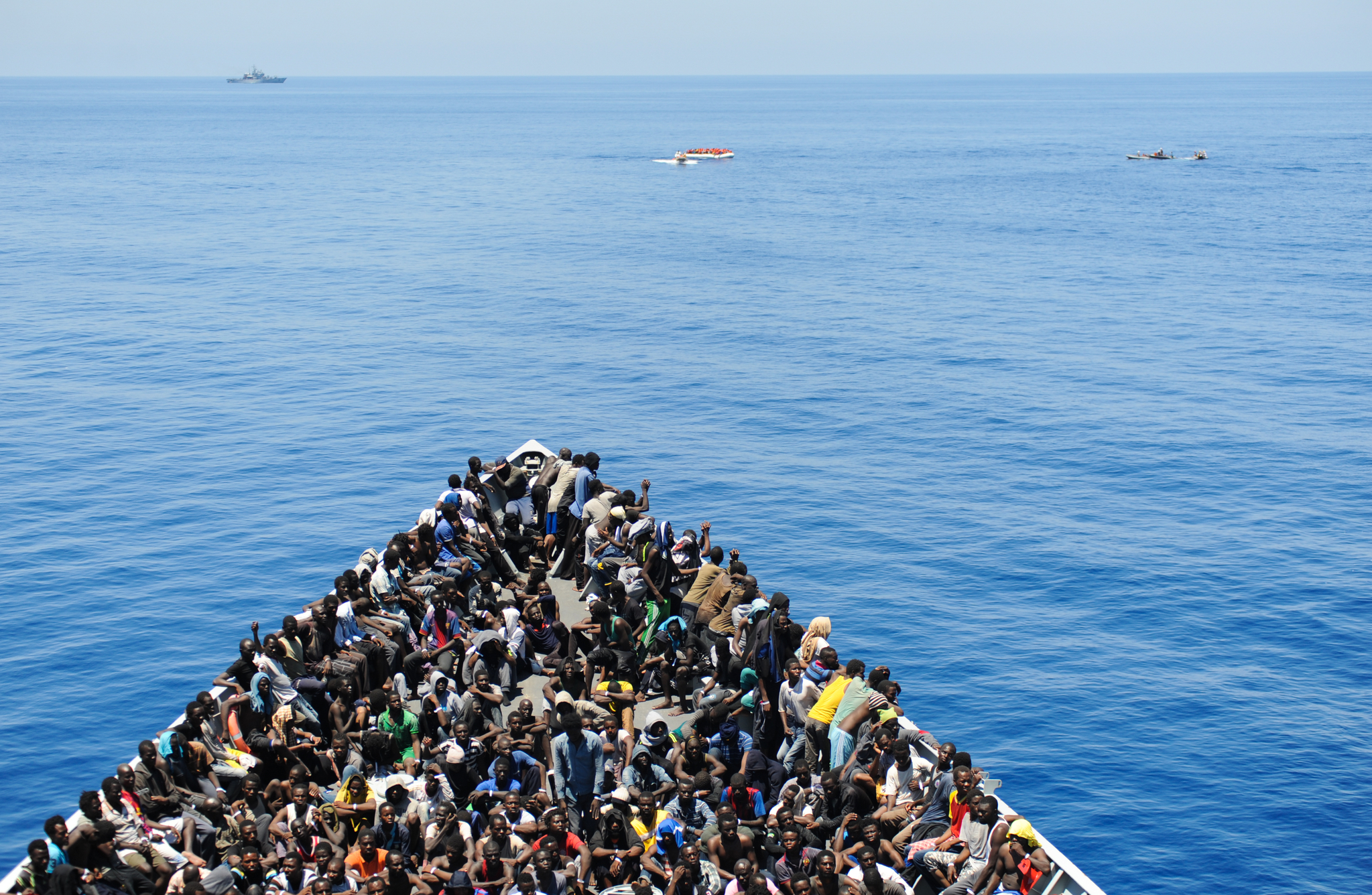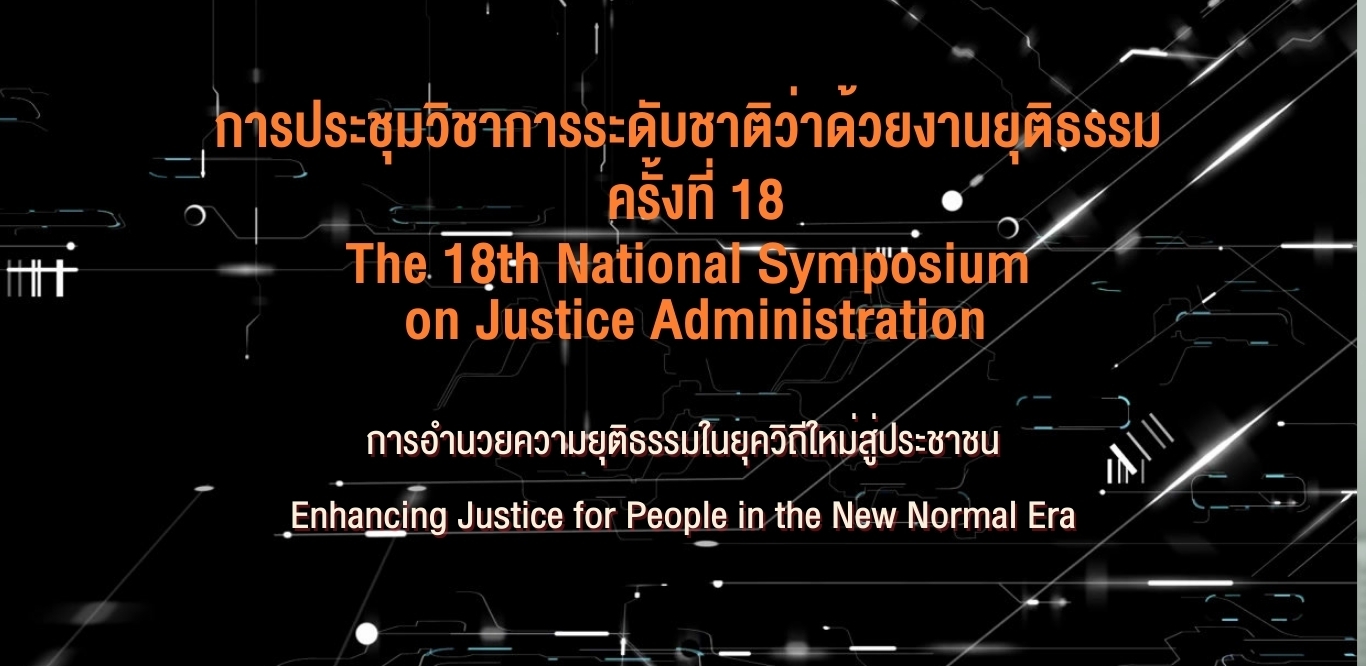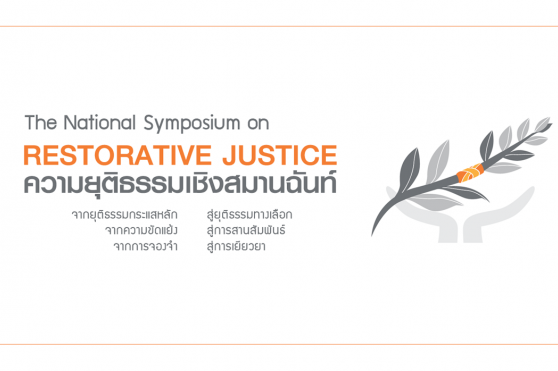Dealing with COVID-19, Its Impacts, World Crime Trends Critical Obstacles to Sustainable Development Goals
"In the face of COVID-19, developed nations like the United States and the United Kingdom have found themselves in a paradoxical situation. Despite their public-health security and economic wealth, their COVID-19 caseload and death toll are relatively higher than those of poorer, and in terms of public health, more vulnerable countries."
Prof. Sheila Jasanoff, an academic from the Harvard University's John F. Kennedy School of Government, raised this point during her presentation on lessons learned from COVID-19 responses because it could hinder efforts to achieve the sustainable development goals (SDGs). The presentation took place as a part of a parallel seminar of the 18th National Symposium on Justice Administration, which was recently held.

The seminar featured specialists and representatives from relevant organizations. Mr. Enrico Bisogno, chief of the Data Development and Dissemination Unit at the United Nations Office on Drugs and Crime in Austria or UNODC Vienna, joined the stage to present world crime trends during the COVID-19 situation. Prof. Jasanoff discussed the world's COVID-19 overview, while Ms. Lovita Ramguttee, deputy representative of the United Nations Development Program (UNDP) Thailand, talked about how COVID-19 affected the path towards SDGs. Dr. Phiset Sa-ardyen, executive director of the Thailand Institute of Justice (TIJ), served as the seminar's moderator.
Speakers at the seminar presented information from their monitoring of COVID-19 responses in many countries and underlined obstacles on the world's path toward SDGs. The event also addressed world crime trends, reviewed transnational crimes, and recommended solutions.
Lessons from COVID-19 Responses around the World
Prof. Jasanoff of the Harvard University's John F. Kennedy School of Government presented the findings from a study on comparative COVID-19 responses. The study, conducted through her collaboration with research institutes in several countries, revealed each nation introduced different policies in response to COVID-19. In this academic's opinion, comparisons should be made because the pandemic has affected the whole world. Moreover, parties involved in the judicial process will need to consider border issues in controlling the outbreak.
A key observation from her study points out that the United States (US), which is ranked No. 1 on the Global Health Security Index Map, has poorly controlled COVID-19. While, India, despite its severe outbreak, has still outperformed some European countries, including Thailand. Prof. Jasanoff, therefore believes the foremost factor to consider is "what criteria we have used in assessing the emergency."
The study, moreover, shows the relations between people and the state. Each state has different relations and context. In Japan, most people are afraid of being stigmatized and are reluctant to admit they have been infected with COVID-19. The Singaporean government, meanwhile, has enjoyed the trust of its people. Most of them have confidence in their state that has long taken good care of them.
On the public-health system, the pandemic has amplified preexisting conditions. If weaknesses exist, they have worsened in the wake of COVID-19. For example, the first wave of COVID-19 seriously hit the elderly in the US, underlining the fact that the US has long failed to take care of its elderly population well enough. During the pandemic, the vulnerable groups face severer impacts than others.
Prof. Jasanoff has focused on lessons learned from COVID-19 responses in several countries. Examining the responses from January 2021, the study reviewed three aspects of COVID-19 responses of countries – health, economy, and politics. In this study, countries have been put in three categories as follows:
1st category - Control; countries that have achieved a significant degree of control over the situation in all aspects. Among them is Taiwan. Learning from its experience with SARS and the 2009 flu (H1N1 virus), Taiwan has controlled COVID-19 with its highly-effective healthcare system. It does not need any lockdown and witnesses just minimal business disruption.
2nd category - Consensus; applied to countries that people have solidly cooperated with their government in the COVID-19 situation. Germany is a leading example here. In Germany, people have taken part in the decision-making process. Backed by researches, their country is able to produce medicines for its own use. German economy is also highly stable, with unemployment benefits for affected people.
3rd category - Chaos; applied to countries with an enormous number of COVID-19 infections and deaths. Without a consensus, chaos prevails in all aspects. These countries' public health sovereignty has been bitterly contested.
The categorical patterns have influenced policymaking. When countries could not control the disease from the very beginning, the risks of facing COVID-19 variants in their territories have also increased.
Importantly, Jasanoff pointed out during the seminar that several countries had fallacies about COVID-19 management policies namely:
1. "A Playbook Can Manage the Plague."
2. "In an emergency, politics takes a backseat to policy." Jasanoff explained that this is wrong because, in reality, a policy would be effective when the political context was also considered
3. "Indicators of success and failure are clear." In Jasanoff's view, there are many indicators, and choosing some depends on decision makers.
4. "Science advisors enable policymakers to choose the best policies." In reality, advice is largely ignored because politicians prefer something different.
5. "Distrust in public health advice reflects scientific illiteracy," Jasanoff said. In fact, such distrust reflects a bigger problem – the lack of trust in the administrative system.
Her study also shows that several countries have responded to the COVID-19 situation with market-stimulus measures, cash handouts, and remedial actions that have not won public approval. In some countries, the pandemic has amplified political division. The public also does not trust experts (ignoring the advice of doctors and public-health specialists). There are even conflicts between the central government and local administrations, which do not work in the same direction.
The study's findings are in line with Ms. Ramguttee's presentation. The deputy representative of UNDP – Thailand said chaos have spread around the world with protests against society, government agencies, and health authorities in the wake of COVID-19. Sexual violence, oppression, and uprisings have also risen.
Still, Ms. Ramguttee explained that "The first thing we have witnessed is the united effort to fight the pandemic. As domestic resources are dwindling, several developing nations have changed the objectives of their resource usage, especially fiscal resources. In the middle-income group (including Thailand), four percent of their gross domestic product (GDP) have been directed to COVID-19 responses. The low-income group has allocated about two percent of the GDP for the purpose. While fiscal gaps are seen, it is clear development-themed investments should be at the heart of post-COVID rehabilitation in every country".
For Thailand, she has made recommendations for three phases:
(1) Short-Term Phase: Focus should be on vulnerable groups (youth, people with disabilities, LGBT, and ethnic groups) who suffer from COVID-19 impacts, with employment promoted within the private sector.
(2) Medium-Term Phase: Thailand should upgrade its public services to better cover vulnerable groups in times of crises. The Social-welfare system, in particular, should become more comprehensive. It should also address gender inequality and, with the integration of technologies and innovations, promote the local economy.
(3) Long-Term Phase: Thailand should move toward a green economy or sustainable economy by driving the growth of the local economy.

UNDP has worked with its country members, including Thailand, in pursuit of SDGs. Its comprehensive action plan – known as 'a broader SDGs push' – aims to create the Inclusive Green Globe. Under this plan, personnel working in the field of digital technologies, both in the private and public sectors, are encouraged to embrace the green economy and emphasize social protection as their work can help various countries recover from COVID-19 impacts.
Lockdowns and Crime Trends during COVID-19 Outbreak: Falling Robberies and Drug Smuggling, Rising Organized Crimes

UNODC researches show some types of crimes such as robberies and drug smuggling have reduced during COVID-19 lockdowns in several countries.
Mr. Bisogno of UNODC Vienna said the number of reported crimes had reduced because of: (1) Reduced opportunities to commit crimes in public areas with people spending more time at home and facing travel restrictions; (2) Border crossings, which curbed access to drug sources; and (3) Victims' or witnesses' growing difficulty in reporting crimes or reach out to state officials in the face of lockdown measures.
It should also be noted that lockdown measures do not have any significant impact on homicides. Statistics show women face the biggest risk of such crime. Rapes and sexual assaults, according to statistics compiled in 36 countries around the world, plunged during the strict lockdown in April 2020. However, they increased again after lockdown measures eased in July and August last year.
Crimes that have significantly risen during lockdowns are organized crimes. Organized groups have committed these crimes for their vested interests, for example, illicit trading of necessary medical equipment that is widely lacking such as PPE gowns, test kits, and disinfecting liquids. During lockdowns, immigrant smuggling has also increased because of the pandemic's economic impacts.
The chief of the Data Development and Dissemination Unit at the UNODC Vienna said low-income countries have seen rising unemployment rate in the wake of COVID-19. As a result, they tend to engage more in the smuggling of illegal migrant workers to countries with better economy. Organized human-trafficking gangs have found opportunities to exploit more illegal workers who want to work in countries with brighter job prospects.
Importantly, in addition to triggering adverse economic impacts and rising crimes, the pandemic has affected the judicial process regarding crime prevention and remedies. Financial and operational obstacles have arisen in the process. The COVID-19 situation, in all, has put a spotlight on inequalities affecting various vulnerable groups such as laborers, women, and low-income earners who are largely ignored in the crisis. Such problems are making it more difficult for the world to achieve its SDGs.
Soaring Crimes Exacerbate "Prison Overcrowding", Hinder Sustainable Development
A common but big problem among several countries today is "prison overcrowding." At the seminar, Mr. Bisogno addressed the issue as follows:
In 2018, the highest occupancy rate of Southeast Asian nations' prisons was at 240 percent. Counting both convicted prisoners and unsentenced prisoners, the rate means the number of prisoners has far exceeded the capacity of prisons.
Between October 2019 and March 2020, Thailand's Corrections Department had implemented measures to ease prison overcrowding. In April 2020, it revealed that it ordered punishment suspension for 8,000 prisoners during the period. Eligible for the suspension or the reduction of actual imprisonment days were well-behaved prisoners who had already completed two-thirds of their term. Thousands of prisoners were released to freedom early to curb prison overcrowding and prevent COVID-19 outbreak in the prisons (Source: https://ilaw.or.th/node/5664).
According to UNODC's 2019 data, Southeast Asian, including Thai prisons showed a better ratio of unsentenced prisoners to convicted prisoners than those in New Zealand, Australia, and South Asian nations such as India and Sri Lanka. These countries' prisons have the highest percentage of unsentenced prisoners in the inmate population. Based on 2019 data, unsentenced prisoners accounted for just 30 percent of the inmate population in Southeast Asia, including Thailand.

An important issue in this context covers the types of crimes that have been rising during the COVID-19 outbreak. Immigrant smuggling is punishable primarily by a jail term. Such ongoing trend suggests that prison overcrowding will worsen, posing a significant obstacle to the fulfillment of SDG16: Promoting just, peaceful and inclusive societies whereby everyone can access justice, and strong institutions are in place to support the access at all levels.
The chief of the Data Development and Dissemination Unit at the UNODC Vienna recommended the following solutions: (1) In the COVID-19 situation, the focus must be on curbing prison overcrowding and preventing the payment of bribes to state officials. Such prevention will complement efforts to fulfill SDG16, and (2) Prisoner Rehabilitation projects are seriously needed in easing prison overcrowding, as they promise to give good citizens to society.
Every country is now battling a crisis. In the wake of COVID-19, inevitable economic, social, and political repercussions are spreading through many countries. In such situation, it is of utmost importance that all sectors join hands in preparing efficient responses and adaptations to thrive for SDGs achievement.
Dr. Phiset Sa-ardyen, executive director of the TIJ, in his capacity as the moderator of the seminar, concluded the key message as follows: "I believe we need global responses to COVID-19 because we are now in a very fragile situation. In the face of this ongoing crisis, we must work with firm determination and dedication so as to empower ourselves. That way, we will be able to deal with the situation and achieve SDGs strongly. Our efforts will benefit everyone in society. No one will be left behind".
You may watch the seminar online here




